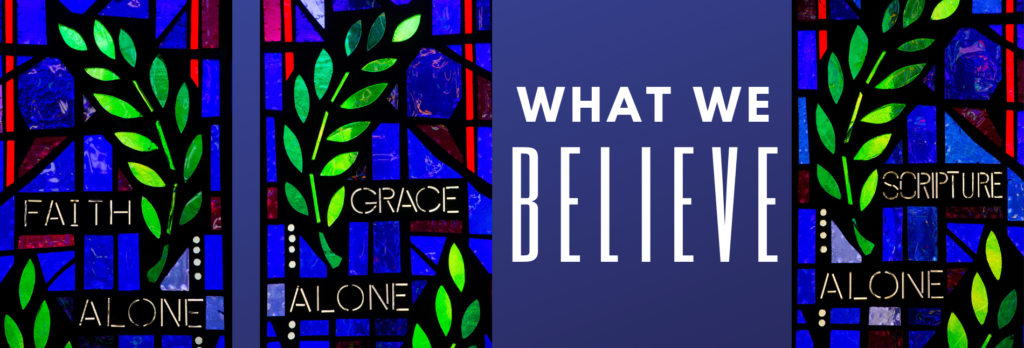
As Christians, our confession and practice of belief is rooted in God’s Word, the Bible, and the historical tradition of our faith as established in the three universal creeds of the Christian faith: the Apostles Creed, the Nicene Creed, and the Athanasian Creed.
Further, we recognize the teachings of Martin Luther as codified in the Lutheran Book of Concord, as the true explanation and teaching of God’s Word. Our commitment to all these is what gives us both the fellowship with the universal and historical Christian Church and the distinctive name of Lutheran.
These first statements can be understood to be generally and universally accepted by all Christians:
- God exists. He is one – eternal, all-powerful, all knowing, and everywhere present. He further reveals Himself to exist in the relationship of three eternal persons, Father, Son, and Holy Spirit. This loving and perfect interrelationship of the Trinity, demonstrated in God’s present and historical work in His created universe, forms the center of all divine activity and purpose. It was from this central expression of love that all reality and humanity were created. This truth about God’s own being is the means and content of all true Christian worship.
- Human evil, in action, thought, and inaction, has fundamentally divided creation and every human soul from God’s perfect love and purpose. Despite the complete goodness and perfection of all that God calls into existence out of nothing, human independence has chosen again and again to separate itself from God. This historical and present choice condemns each of us and all creation to an experience of life that includes suffering and death. No human person can in him/herself fix what has been broken by our self-imposed separation from God and His love.
- God’s love for each person and all creation is not thwarted by our failing and evil. Throughout history and still today, He actively works to defeat evil, suffering, and death. This work is demonstrated chiefly in the life of Jesus of Nazareth, a human man, whom Christians recognize as the “Chosen One” or “Christ” according to the Bible and as the “Son of God” or “God, the Son”, the second person of the Trinity. As fully God and fully a human man, Jesus preached a message of a restored relationship between humanity and God which would be accomplished through a triumph over evil and death. In living a perfect life, suffering an unjust death by crucifixion, and coming back to life, He completely defeated evil and opened a new way of life in which each person can experience the relationship of God and His love for creation once lost, now restored. This new life is experienced in the present world and eternally.
- This work of salvation, which was impossible for us on our own, is accomplished by Jesus Christ. Because of this reconciling work of God, each person is no longer condemned in the sight of Divine justice by his or her own evil, but instead can experience God’s love and a restored relationship with creation and human community. We enter into this by faith, believing in the truth of Jesus’ message and the power of his resurrection. All that is good in our lives and actions stems from this faith, and without this trust, no amount of good action would be sufficient to restore us into the relationship of love at the center of God’s triune existence.
- The fellowship of Christians, or Church, exists authentically where this message is faithfully taught and the nourishment of faith in teaching and practice is rightly administered. True belief is sustained and expanded as the message is made known by the power of God, the Holy Spirit, the third person of the Trinity.
These next statements are central to how Lutheran Christians have believed and practiced our faith in Jesus Christ. We believe them to be based on the truth of Scripture and demonstrated in the history of Christian tradition to be faithful to God’s revealed truth.
- We believe in Scripture, as presented in the 39 books of the Old Testament and 27 books of the New Testament. This book of books, or Bible, is the entire and wholly sufficient revelation of God’s written word. Through the Holy Spirit, every word was inspired in its writers and is the infallible rule of faith and authority among Christians. While some Christians hold tradition, reason, or experience to be equal to or perhaps above this revealed truth, Lutherans have historically claimed “Scripture Alone” as the final authority in our practice of belief.
- We believe that our reconciliation with God and His plan is accomplished solely by the work of Jesus Christ: all human effort and aspiration is completely insufficient to atone for the history of evil and suffering that is the birthright of every person. This evil, which we often call “sin”, taints all attempts at restoring ourselves in the sight of Divine justice. Thus, we rely solely on faith in Jesus’ work of redemption to justify us. Our historical cry of “Faith Alone” signifies our avoidance of any attempt to use our own accomplishments or righteousness to cover over our sin. This faith is demonstrated by our obedience to Jesus’ teachings, which show His power in us to bring forth love and enduring goodness inspite of our history and weak wills, but only faith (which is itself a gift of God, the Holy Spirit) can gain mercy for the legacy of evil of which we are heirs and perpetrators.
- We believe in the unique impact of two practices or “sacraments” in nourishing faith in Christians: Baptism and Holy Communion. Jesus himself was baptized and instituted the first communion meal (which is why it is often known as the “Lord’s Supper”). When a person is baptized, we believe that sins are forgiven, the power of evil is overcome, and the promises of God’s salvation through Jesus are granted. This happens through water and God’s Word. We believe that in Holy Communion, we experience the presence of Jesus: in, with, and under the bread, which He has said in Scripture “is my body which is broken for you;” and in, with, and under the wine, which “is the new covenant in my blood.” This belief about the true nature of communion as the very body and blood of Jesus is consistent with the early Christian practice of these sacraments – holy and reverent acts of worship which were instituted by Jesus for us, that we would experience with all our physical senses the power of the Holy Spirit creating and strengthening faith and belief in each of us.
- We believe the unifying message of good news or “gospel” found in the Bible is a story of God “for us”, which is most significantly demonstrated in the death of Jesus Christ. God Himself endured human death as a substitute for the death humanity had rightfully earned for our role in plunging creation into evil. This evil or sin, by its nature, is fundamentally a choice for pride over humility, for death over life, for self over God. The consequences are that we reap precisely what we seek – separation from God in death and destruction, which is also what Divine justice rightly renders as the judgment for all evil. Yet God, in compassion and mercy, delivered the ultimate punishment for evil not on His creation but on Himself. Jesus endured the full punishment for all sin and evil and died a criminal’s death – crucifixion. In enduring all this, we recognize that God is both the just judge of evil and the rightful justifier of any and all He chooses to pardon in grace. Jesus Christ died in our place to demonstrate His love for every person and His willingness to show grace to all who rely Him.
- We believe that the guiding principle to understanding God’s Word is that of “Law and Gospel”. The Law, demonstrated chiefly in the stipulations of covenant and promise to the people of ancient Israel, was given to them to set them apart from the nations among which they lived as a witness and blessing. Yet, even with God’s direct intervention in their history, they could not obey the requirements of the Law. Many today, even those who take the name of “Christian”, seek to enumerate the conditions and rules which a person must follow to be one of God’s chosen people. Then as now, the requirements of living perfectly according to the Law remain beyond all people except Jesus. His perfect life and redeeming death are the fulfillment of the Law and the chief sign of the Gospel which shows God’s work for us. Thus, effect of the Law, which still directs us toward good actions that accomplish God’s justice and demonstrate His goodness, nevertheless is completed only in the Gospel. God’s love, made known perfectly in Jesus, is a gift we could never earn without Him. In knowing and trusting in God’s love, we find it a more certain foundation for experiencing and showing the powerful purpose of restored relationship with God than Law can ever provide. Knowing the difference between Law and Gospel is, we have found, a necessary part of knowing God and His work rightly, and thereby being freed to a true vocation of peace with God as His chosen people.
Photo courtesy of The Lutheran Church—Missouri Synod.
